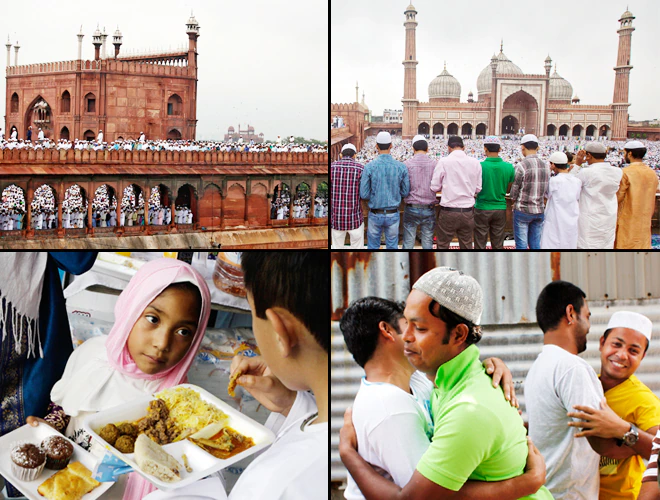Table of Contents
Introduction:
Eid Mubarak, meaning “Blessed Eid,” is a greeting exchanged by Muslims around the world during the festive occasion of Eid al-Fitr and Eid al-Adha. These two annual Islamic holidays hold immense significance in the Muslim calendar, marking the culmination of Ramadan, the holy month of fasting, and the completion of the Hajj pilgrimage, respectively. In this comprehensive guide, we delve into the rich cultural, religious, and social dimensions of Eid Mubarak, exploring its origins, traditions, customs, and universal message of peace, love, and harmony.
The Essence of Eid Mubarak:

At its core, Eid Mubarak encapsulates the essence of joy, blessings, and goodwill that characterize the spirit of Eid celebrations. It is a greeting imbued with sincerity, warmth, and affection, expressing heartfelt wishes for happiness, prosperity, and spiritual fulfillment. Whether exchanged in person, through phone calls, or via social media, the words “Eid Mubarak” serve as a reminder of the shared bonds of faith and community that unite Muslims around the world.
Origins and Significance of Eid al-Fitr and Eid al-Adha:
Eid Mubarak is closely associated with two major Islamic holidays: Eid al-Fitr and Eid al-Adha. Eid al-Fitr, also known as the Festival of Breaking the Fast, marks the end of Ramadan and is celebrated with prayers, feasts, and acts of charity. Eid al-Adha, or the Festival of Sacrifice, commemorates the willingness of Prophet Ibrahim (Abraham) to sacrifice his son Isma’il (Ishmael) as an act of obedience to God and is observed with prayers, animal sacrifices, and the distribution of meat to the needy. Eid Mubarak serves as a universal greeting for both occasions, embodying the spirit of joy, gratitude, and unity that defines these sacred holidays.
The Rituals and Traditions of Eid Celebrations:
Eid Mubarak is often accompanied by a range of rituals and traditions that vary by culture, region, and family customs. However, certain practices are common across Muslim communities worldwide, including:
Special prayers: Muslims gather in mosques or outdoor prayer grounds to perform the Eid prayer, known as Salat al-Eid, which consists of two rak’ahs (units) and is followed by a sermon delivered by the imam.
Zakat al-Fitr: Muslims give a mandatory charity known as Zakat al-Fitr to the needy before Eid prayers, ensuring that everyone can partake in the festivities and enjoy a bountiful celebration.
Family gatherings: Eid is a time for families to come together, share festive meals, exchange gifts, and reconnect with loved ones, strengthening bonds of kinship and fostering a sense of belonging and community.
Acts of kindness: Muslims engage in acts of charity, hospitality, and service to others during Eid, embodying the values of compassion, generosity, and empathy that lie at the heart of Islamic teachings.
Cultural Diversity and Global Unity:

Eid Mubarak transcends cultural and geographical boundaries, serving as a unifying expression of Muslim identity and solidarity. While the customs and traditions associated with Eid may vary from one country to another, the underlying message of compassion, tolerance, and unity remains constant. Muslims of diverse backgrounds and nationalities come together to celebrate Eid, showcasing the rich tapestry of human diversity and the universal principles of brotherhood and sisterhood that unite them as members of the global Muslim ummah.
Challenges and Opportunities Amidst Modernity:
In an increasingly interconnected and fast-paced world, the observance of Eid Mubarak faces new challenges and opportunities. Rapid urbanization, globalization, and technological advancements have reshaped the way Muslims celebrate Eid, influencing everything from travel and communication to fashion and entertainment. While these changes offer new avenues for connection and expression, they also present challenges such as balancing tradition with modernity, preserving cultural heritage, and addressing social issues such as poverty, inequality, and conflict.
Eid Mubarak in the Digital Age:
The advent of digital technology has transformed the way Eid Mubarak is exchanged and celebrated, enabling Muslims to connect with loved ones across the globe through virtual gatherings, social media platforms, and messaging apps. From virtual Eid prayers and online charity campaigns to digital greetings and e-gift exchanges, technology has made it easier than ever for Muslims to share the joy and blessings of Eid with family and friends, regardless of geographical distance or physical barriers.
Conclusion:
As Muslims around the world exchange the heartfelt greeting of Eid Mubarak, they come together in a spirit of unity, compassion, and gratitude to celebrate the blessings of faith, family, and community. Whether through traditional customs or modern innovations, the essence of Eid Mubarak remains unchanged, serving as a reminder of the timeless values and principles that define the Muslim faith. May Eid Mubarak be a source of joy, peace, and blessings for all, uniting hearts and minds in the universal quest for love, harmony, and spiritual fulfillment.
For More Information Please Visit These Websites Craiyon And arturia


1 Comment
Your article helped me a lot, is there any more related content? Thanks!